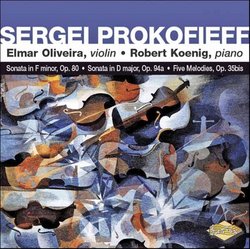| All Artists: Sergey Prokofiev, Robert Koenig Title: Prokofieff: Sonata in F minor, Op. 80; Sonata in D major, Op. 94a; Five Melodies, Op. 35bis Members Wishing: 0 Total Copies: 0 Label: Artek Original Release Date: 1/1/2006 Re-Release Date: 6/20/2006 Genre: Classical Styles: Chamber Music, Historical Periods, Classical (c.1770-1830), Instruments, Reeds & Winds, Strings Number of Discs: 1 SwapaCD Credits: 1 UPC: 661853002926 |
Search - Sergey Prokofiev, Robert Koenig :: Prokofieff: Sonata in F minor, Op. 80; Sonata in D major, Op. 94a; Five Melodies, Op. 35bis
 | Sergey Prokofiev, Robert Koenig Prokofieff: Sonata in F minor, Op. 80; Sonata in D major, Op. 94a; Five Melodies, Op. 35bis Genre: Classical
|
Larger Image |
CD Details |
CD ReviewsMost of Prokofiev's Violin/Piano Works, Done Nicely J Scott Morrison | Middlebury VT, USA | 07/20/2006 (4 out of 5 stars) "This CD faces stiff competition. Itzhak Perlman and Vladimir Ashkenazy recorded the two sonatas ten years or more ago. David Oistrakh and Sviatoslav Richter recorded the First Sonata before that. Each of those performances is extremely effective. However, here Elmar Oliveira and Robert Koenig come very near to meeting the challenge. My only real complaint about the present recordings is that the last little bit of edge and bite in the anguished portions of the First Sonata is missing. Perlman's way with the Second Sonata -- a much sweeter and lighter-weight work originally written as a Flute/Piano sonata -- is more winning. Still, I am more than happy to have these versions. Individually Oliveira and Koenig are superb artists and they have corroborated enough that they clearly are able to communicate effectively with each other. Oliveira is the only American to have won the Tchaikovsky Competition for violin. Koenig is primarily a corroborative artist whose work is sensitive and yet not self-effacing.
The First Sonata is one of Prokofiev's greatest chamber works. It is in four movements. The first is both anguished and mysterious in import. The silvery modal violin scalework over simple piano chords in the second part of the movement is both eerie and portentous. The motoric and agitated second movement is related to similar passages in the so-called War Sonatas for Piano (Nos. 6-8) written during the same time period (between 1939 and 1946). The third movement provides a bit of lyrical respite to the foregoing movements. Movement IV is similar to II except that this time the agitation resolves into a kind of optimism that is then superseded by a return to the gloomy mood of the opening movement. One can hear this sonata as a journey from pessimism through somewhat frantic desperation to brief respite, temporary optimism and then the crashing in of dark hopelessness again. This may or may not have been Prokofiev's intent, but given the time in which the sonata was written (and the nature of his corresponding War Sonatas) this is probably not too far-fetched an understanding of the work. The Second Sonata is an entirely different matter. It was originally Prokofiev's Flute Sonata. His dear friend David Oistrakh asked him to make a version for violin and piano. The work is lyrical, mostly light-hearted and tuneful. It is probably played more often than the First Sonata for that reason. Oistrakh recorded it, I'm told, four times although I confess to not knowing any of those versions. I is lyrical in the extreme, with a middle section that is somewhat more motoric. II is playful and virtuosic. III is melancholic with piano and violin trading off the beautiful main melody with each other. IV is sprightly, with quintessential Prokofiev sweet-tart harmonies. There is a middle section that is lyrical and nostalgic before the catchy main theme returns for a brilliant finish. The 'Five Melodies', Op. 35bis, is an early work (1920), an arrangement of five vocalises. They are, of course, lyrical, with arching songful violin lines over rather busier piano accompaniments. This CD is recommended as a modern-sound version of these works. Neither the Perlman or Oistrakh CDs contain all the works included here. Scott Morrison" |

 Track Listings (13) - Disc #1
Track Listings (13) - Disc #1